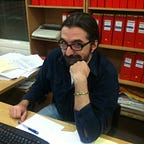That’s What’s Great About Civilization
It’s just three things, I think
Jessica Wildfire asked a very good question in her piece, “What’s So Great About Civilization?”
This might be one of those questions that have long troubled our great thinkers. I imagine that someone, when studying history or personally experiencing some terrible calamity, a great war, a plague or even the collapse of their world, might have come to wonder: what, if anything, is worth salvaging?
So what is it?
It’s telling that we have a hard time defining civilization itself. Is it building cities? Forming societies? Establishing religions? Making laws and enforcing them? Is it government? Is it the written word? Is it language?
I would tell you that all these things are the building blocks of civilization. There have been civilizations without some of these components, except language, society and religion.
One could say that a basic tribal society has many things in common with animal packs, especially primates which tend to form close-knit communities with recognizable social dynamics. Therefore a tribe is really the evolution of the pack.
Most animals also have some sort of basic communication ability. Not a language as we understand it, but I would guess not very different from the mode of communication of the first human tribes, using grunts and gestures, that would later develop into a more elaborate system of sounds and words.
What I’m not aware of is a civilization without some system of religion. Could religion be the first real step of humankind towards forming a civilization?
It’s an interesting (and quite thorny) question, and one best left for another time. The question I’m trying to answer here is not what civilization is or how it started, but what’s so great about it?
For me, it’s three things: art, science and philosophy. Art is also notoriously hard to define. Science and philosophy, in very broad terms, have to do with our quest for truth and understanding.
Art, perhaps, is the answer to our quest for immortality. It’s the only way we can somehow immortalize our human experience and share it across the boundaries of time. Long after the artist is gone, their work leaves behind a glimpse into their psyche and hopefully makes generations of humans after them feel something.
In the rather messy 2008 remake of the classic The Day the Earth Stood Still movie, the alien who considers whether to eliminate the human race in order to save Earth is impressed by the Goldberg Variations by Johann Sebastian Bach.
I’m not sure if sentient aliens would be able to appreciate our music, our painting or our arts in general. Perhaps their physiology would be too different for them to experience our art in a meaningful way. Our literature would probably be impossible for them to understand without having spent a long time studying and understanding us. That’s why the filmmakers picked music, as to us it’s the most universal language. Bach is considered the most “mathematical” composer of his era, maths being another possible universal language.
The works of Bach, Shakespeare, Euripides, Van Gogh, Kubrick, Michelangelo, Plath, Rodin, the voices of Callas and Houston, the riffs of Black Sabbath, the acting of Brando, Kabuki and Capoeira dance forms, the folk ballads of Ireland and Crete, the epics of Gilgamesh and Odysseus, the sound of the blues and Mongolian throat singing and so many other genres, works and artists, famous and obscure, great and small, the thought of all our art fading to nothing and being lost forever is hard to bear for me.
There is a lot of “stink” as Jessica puts it, for sure. Literal and metaphorical. A lot of waste, which our civilization can’t seem to be able to handle. There is a lot of ugly. We try to bury it under the rug. It’s a futile effort.
But that’s not all there is.
Is our art enough to justify our existence? Is our quest for knowledge, for understanding the universe and its mysteries our true purpose? Is consciousness and self-awareness an accident or are they our raison d’être? No one can say. But if there is a reason we’re here, then these pursuits are out best candidates for it, I think.
I can tell you for sure that endlessly growing the economy to the detriment of the quality of our lives (and that of every other species) on the planet is not our purpose. Nor is it in our long-term interest to pursue rampant growth.
That’s called cancer.
And, when all is said and done, it doesn’t matter whether our intelligence, our need to express ourselves, to break the boundaries of our limited lifespans, to understand the universe, are all just a rare accident or the universe’s (or some supreme being’s) grand design.
It’s here, now, and we must do everything we can to protect it. Our life. All life. And we need to be better. We need to focus on what’s important. We need to adjust. It took us 3.7 billion years to go from microbes to a bipedal mammal able to compose Beethoven’s 9th symphony while deaf.
It would be such a waste if we squandered this miracle for just 200 years of burning hydrocarbons for “profit”.
Wouldn’t it?
